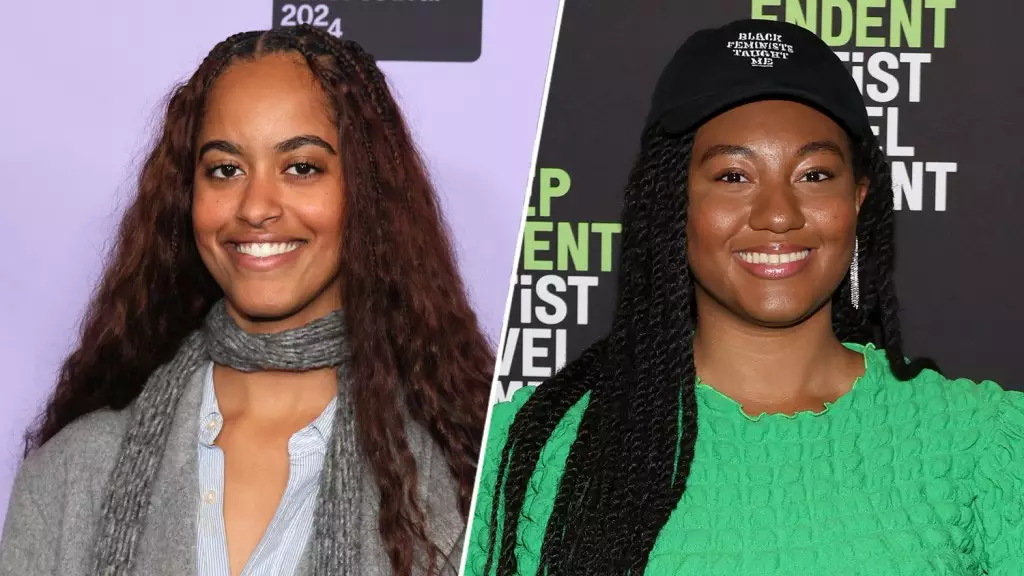In a well-circulated narrative that emerged from the 2024 Sundance Film Festival, the budding directorial venture of Malia Obama, in her film “The Heart,” has been fraught with controversy. Accusations hurled by fellow filmmaker Natalie Jasmine Harris have raised uncomfortable questions surrounding the thin line between inspiration and imitation. Harris claims that elements in Obama’s latest Nike ad bear striking resemblances to her own film “Grace,” presenting a scenario reminiscent of a larger conversation about creative integrity in the ever-evolving landscape of art and media.
Harris, who competed alongside Obama at Sundance, revealed her dismay in a heartfelt essay for Business Insider. Herein lies a pivotal moment that underscores a more profound systemic problem: how the voices of independent creators are often overshadowed by those who bask in the glow of established legacies. Malia Obama, with her lineage and connections, straddles this divide precariously, emblematic of a cultural milieu that tends to favor the familiar over the innovative.
Analyzing the Nuance of Artistic Expression
Dissecting Harris’s arguments brings forth a nuanced perspective on what constitutes artistic ownership. “Pat-a-cake,” a game that is as old as time, may not belong exclusively to anyone, but the way it is portrayed—through camera angles, color palettes, and framing—can express a unique vision that is indeed proprietary. Harris’s frustration stems from a fear that it is not simply about a shared activity; it is about who gets to narrate the story, dictating the visuals that define that narrative.
Moreover, this incident points to larger issues of diversity and opportunity within the film industry. While creative inspiration is often glorified, the reality is that minority voices continue to be marginalized. Harris’s plea is a call for acknowledgment and respect for original creators—a vital requirement for a thriving arts ecosystem. Her experiences reflect a collective sentiment among many artists who find their brilliance co-opted by the established elite.
The Double-Edged Sword of Recognition
Malia Obama represents a unique figure in this dynamic, as she navigates her identity as both a public figure and an artist. Her association with Nike’s global brand undoubtedly provides her an invaluable platform. Still, it also creates an imbalance—which implicates both her and the brands indulging in this creative retread. The intention may not be malicious, but the impact often undermines the hard work of emerging artists who strive to carve their own paths in an already challenging industry.
While some might rationalize Harris’s critique by arguing that her concepts are not proprietary, it neglects the systemic nature of the industry whereby established names create waves while nascent talent struggles to gain traction. As Harris points out, the pathway for independent filmmakers to gain recognition has never been easier to jeopardize. The dominance of big names not only clogs the market but erases the multitude of nuanced narratives waiting to be told.
Confronting the Status Quo
As this narrative continues to unfold, it serves as a palpable reminder that acknowledgment is paramount. Artists like Natalie Jasmine Harris—not simply in this instance but across the board—deserve recognition and respect for their contributions. It forces us to wrestle with the stark reality that innovation thrives when creativity is nurtured rather than appropriated—an ethic that is blindingly overlooked in today’s film culture.
The echo of such controversies calls upon us to critique the broader structure of the industry. It raises questions on how we define success and what voices we amplify as a society. If we truly value originality and diverse storytelling, we must advocate for equitable creative spaces where all voices can resonate, not just those glimmering under the weight of legacy.
The relationship between inspiration and originality requires a recalibration of our cultural lens, particularly when monumental figures become involved. Malia Obama’s journey as a filmmaker must now confront this reality, and Harris’s experience is a rallying cry that should not go unacknowledged in the pursuit of authentic artistic expression.


Leave a Reply